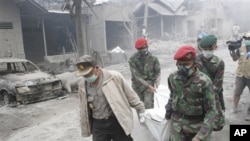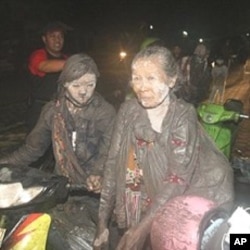Indonesia's Mount Merapi has unleashed a violent eruption that more than doubled its earlier death toll, to more than 100 people. It has also forced evacuation camps to relocate, and the president has declared the situation a national disaster.
Relief workers Friday scrambled to relocate panicked evacuees after Merapi's latest blasts, which killed scores of people. The eruption has continued non-stop since late Thursday sending hot gas clouds, ash and debris raining down.
President Susilo Bambang Yudhoyono has put the country's national disaster management agency in charge of the relief operation.
Officials extended the evacuation area to 20 kilometers from the crater, since the latest victims were killed when a superheated gas cloud set fire to villages 18 kilometers away.
The increasingly powerful eruptions have challenged relief efforts and stirred panic among evacuees forced to move for the second time in two days. Nearly 90,000 people are now in need of shelter.
Hari Eko Yulianto, the head of the Indonesian Red Cross in nearby Yogyakarta, said trucks arrived on Thursday to help move evacuees further down the volcano, but the eruption led to chaos.
Yulianto said that because people panicked, some of the victims were separated from their families; so there were some going to the main barracks and others going to other barracks. Yulianto added that people are now staying in tent camps in sports fields. Relief workers are focused on gathering enough basic supplies, such as water masks and eye drops, to last one week.
The Red Cross is working with Indonesian authorities to arrange the camps according to neighborhoods and ensure that families stay together.
The eruption overnight shot a plume of ash and debris four kilometers high. The ash has darkened the skies in the city of Yogyakarta and sent grey dust and sand raining down on areas up to 30 kilometers from Merapi's summit. All flights in the immediate area have been cancelled.
Surono, the head of Indonesia's Volcanology and Geological Disaster Mitigation Agency, says the volcano's activity is coming from much deeper than in eruptions in 1997 and 2006.
"Before, the magmatic chamber is very shallow and the volume not so high, not so big," Surono noted. "But in this period of eruption in 2010, the magmatic chamber is very big and very deep, so it's why the eruption is so big."
He worries that if the deep volcanic earthquakes increase in frequency and intensity Merapi could erupt with even more power.
The country's most active volcano has been creating havoc for 10 days. People in the camps say they are scared for their lives and their futures. To ease some of those fears, President Yudhoyono announced that the government will buy all the cattle that remained on the volcano. He also said police will be tasked with securing empty houses and keeping people out of the danger zone.
Until Wednesday officials were allowing farmers to return to their homes to care for their crops and livestock. Now they say the volcano has become too dangerous.





